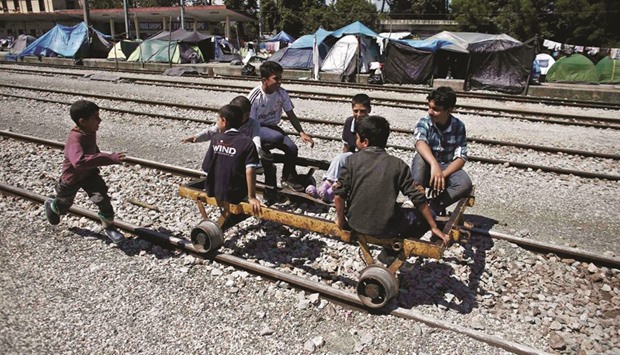Greece said yesterday it will step up efforts to clear the squalid camp of Idomeni where over 8,400 migrants remain on the border with Macedonia after braving a winter in vain hope of being allowed through to Europe.
“The transfer of refugees trapped at Idomeni to hospitality areas probably begins tomorrow ,” Yiorgos Kyritsis, the government’s migration spokesman, told state news agency ANA yesterday.
Most of the migrants are to be moved to camps at former industrial facilities near Greece’s second city Thessaloniki over 10 days, he added, as Greek media reported that around a dozen squads of riot police were heading to Idomeni.
The migrants have spent a brutal winter in the freezing rain and mud, with aid groups struggling to keep them fed and healthy, prompting several attempts to force their way across the border.
“We hear there will be a police operation tomorrow to drive us out,” said Ahmed, a 35-year-old Syrian from Hama.
“We don’t want to go to an army camp. What will they do, kill us?” he asked.
However, the news was welcomed by the EU commission, with spokesman Margaritis Schinas saying Brussels has “repeatedly expressed the view that these people should be moved from the makeshift camp to more organised reception facilities.”
“We hope that (violence) will not be necessary,” he said.
Migrants fleeing war, persecution and poverty in the Middle East and Asia have found themselves stranded at Idomeni after Macedonia and other Balkan states denied them passage to northern Europe.
Many of the camp’s residents are women and children desperate to be reunited with male relatives who have pushed ahead on their own - with the aid of smugglers - hoping to find a place of refuge in EU states more financially viable than debt-hit Greece.
A Greek government source earlier told AFP: “We will carry out a broader transfer operation as we have 6,000 available places in reception centres,” adding that the operation would be gradual and that authorities hoped to avoid the use of force.
“There will be a police presence and we will be persuasive, but we do not foresee pervasive use of force to make all these people leave in one go,” the official said, indicating that there are currently 8,400 people at the camp.
There are over 54,000 migrants stranded in Greece according to government estimates.
The leftist government of Greek Prime Minister Alexis Tsipras has for months been trying to persuade many of the migrants to move away from makeshift tent cities at Idomeni and the port of Piraeus for their own comfort and safety.
Through persuasion, the number of migrants at Piraeus was brought down from around 5,000 people in March to 1,500.
However, many are wary of relocating to organised camps away from the border or the city of Athens, because it could be harder to find people smuggling contacts.
State television ERT said yesterday that additional translators were also being dispatched to Idomeni to assist the operation.
Over the past two weeks, some 2,500 people were persuaded to relocate from Idomeni to state-run camps in the Greek interior, many of them converted former army bases, a police source told AFP.
“In the last two weeks, there has been a ‘mild’ evacuation effort (through persuasion) that has already seen 2,500 people move out...this will continue,” the officer said.
Last month, some 260 people were injured when Macedonian police fired tear gas in a bid to prevent a large group from storming the border.
Doctors at the scene said rubber bullets were also used, but the Macedonian authorities denied this.
Local authorities and farmers have been for weeks pressing the government to evacuate the camp, pointing to an alleged rise in petty crime.
The governor of Central Macedonia region Apostolos Tzitzikostas last week filed a complaint over the issue with judicial authorities, accusing the government of allowing the area to descend into lawlessness.
The government was also criticised as the camp’s sprawling size had effectively put out of action Greece’s main commercial rail link through Macedonia, forcing companies to reroute their goods via neighbouring Bulgaria at higher cost.

Syrian refugee children play with a wagonette at a makeshift camp for migrants and refugees at the Greek-Macedonian border near the village of Idomeni.
